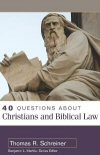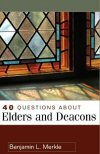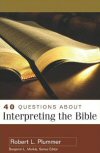Kregel Theology Collection (10 vols.)
Digital Logos Edition
Overview
The Kregel Theology Collection combines some of the best theology resources available in one bundle. Authors such as Darrell Bock, Tom Schreiner, and Daniel Wallace provide masterful studies on the text of the Bible and Christian theology. This collection includes resources covering Old and New Testament studies, ministry, and biblical and systematic theology.

Key Features
- Provides works from respected evangelical authors
- Covers relevant topics in biblical and theological studies
- Equips pastors to answer common questions about the Bible and theology
Individual Titles
- 40 Questions about Christians and Biblical Law by Thomas R. Schreiner
- 40 Questions about Elders and Deacons by Benjamin L. Merkle
- 40 Questions about Interpreting the Bible by Robert L. Plummer
- 40 Questions about the End Times by Eckhard Schnabel
- Four Views on the Warning Passages in Hebrews edited by Herbert Bateman IV
- Jesus the Messiah: Tracing the Promises, Expectations, and Coming of Israel’s King by Herbert Bateman IV, Gordon H. Johnston, and Darrell L. Bock
- Messiah’s Coming Temple: Ezekiel’s Prophetic Vision of the Future Temple by John W. Schmitt and J. Carl Laney
- Revisiting the Corruption of the New Testament: Manuscript, Patristic, and Apocryphal Evidence edited by Daniel B. Wallace
- Warfare in the Old Testament: The Organization, Weapons, and Tactics of Ancient Near Eastern Armies by Boyd Seevers
- What the Old Testament Authors Really Cared About: A Survey of Jesus’ Bible edited by Jason S. DeRouchie

Thomas Schreiner explains the interplay between Christianity and biblical law in this excellent addition to the 40 Questions & Answers series. Schreiner not only coherently answers the tough questions that flow from a discussion about Levitical law, but also engages students in an engaging and clear style.
Questions include . . .
- What does the word “law” mean in the Bible?
- Was the Mosaic covenant legalistic?
- Does the Old Testament teach salvation by works?
- Does Paul teach that the Levitical law is abolished?
- Does Paul’s teaching on justification contradict Jesus’ message?
- Do James and Paul contradict one another?
- What is theonomy?
This book is an instant classic that deserves a wide readership.
—A. Andrews Das, distinguished chair of religious studies, Elmhurst College
Thomas R. Schreiner is James Buchanan Harrison Professor of New Testament Interpretation at Southern Baptist Theological Seminary in Louisville, Kentucky. Schreiner is a Pauline scholar and the author or editor of numerous books, including the Zondervan Commentary on the New Testament: Galatians, the New American Commentary: 1, 2 Peter, and Jude, and the Baker Exegetical Commentary on Romans.

Benjamin Merkle’s question-and-answer volume tackles the major questions that pastors, church leaders, and students ask about church government. Merkle clearly analyzes key passages, succinctly answers common questions, and provides questions for group discussion. The format makes it easy for readers to quickly find the answers to their most pertinent questions.
Benjamin L. Merkle is professor of New Testament Greek at Southeastern Baptist Theological Seminary and is editor of the 40 Questions & Answers series.

Robert L. Plummer tackles major questions students, pastors, and laypeople ask about reading and understanding the Bible. Plummer divides his work into four parts: getting started, approaching the Bible, approaching specific texts, and issues in recent discussion. The accessible format allows teachers to utilize this book as a textbook, and the curious student to understand the issues which are most pertinent to their study. This volume is essential reading for any student in biblical studies, as well as pastors looking to teach the Bible with confidence.
Read this excellent primer and read the Bible better as a result.
—Darrell Bock, senior research professor of New Testament studies, Dallas Theological Seminary
Aristotle once said that those who wished to succeed must ask the right preliminary questions. Plummer asks 40 of them. Even better: he answers them, providing beginning students with all they need to know about biblical interpretation in general and the specific kinds of texts found in the Old and New Testaments in particular.
—Kevin Vanhoozer, research professor of systematic theology, Trinity Evangelical Divinity School
How appropriate that Plummer’s 40 Questions about Interpreting the Bible is itself eminently understandable, crystal clear, and thoroughly engaging. The organization and breadth of coverage make this book both a delight to read and highly instructive. . . . I can’t imagine a more helpful introduction to the subject of biblical interpretation.
—Bruce Ware, T. Rupert and Lucille Coleman Professor of Christian Theology, Southern Baptist Theological Seminary
Robert L. Plummer is associate professor of New Testament interpretation at Southern Baptist Theological Seminary. He has served in missionary assignments in China, Israel, Trinidad, Ghana, Malaysia, and Turkey. Plummer is the author of Paul’s Understanding of the Church’s Mission. He has contributed to the Westminster Theological Journal (69 vols.), the Journal of the Evangelical Theological Society (42 vols.), the New Holman Bible Dictionary, the Southern Baptist Journal of Theology (11 vols.), and many other publications. He is a member of the Evangelical Theological Society and the Institute for Biblical Research.

Biblical, and broadly accessible, Eckhard J. Schnabel makes sense of one of the Bible’s most difficult topics. Schnabel answers common questions about the return of Christ, the millennium, the final judgment, the rapture, heaven, hell, and the future of the world. Schnabel carefully studies the biblical text in light of its first-century context. The result is an even-handed treatment that avoids sensationalism.
Eckhard Schnabel is professor of New Testament at Gordon-Conwell Theological Seminary. Schnabel is also the author of Early Christian Mission and Paul the Missionary: Realities, Strategies and Methods.

Using the popular four-views format, this volume explores the meaning of the five warning passages in the book of Hebrews to both the original readers and us today. Each of the four New Testament scholars present and defend their view and critique the view of their interlocutors. This unique volume will help readers better understand some of the most difficult passages in all of Scripture.
Herbert W. Bateman IV (PhD, Dallas Theological Seminary) has taught Greek language and exegesis for more than 20 years. He is currently professor of New Testament studies at Southwestern Baptist Theological Seminary. Bateman is the author or editor of many works on the General Epistles, including Charts on the Book of Hebrews, Four Views on the Warning Passages in Hebrews, and a forthcoming commentary on Jude and 2 Peter.

Few books have sought to exhaustively trace the theme of Messiah through all of Scripture, but this book does so with the expert analysis of three leading evangelical scholars. For the Bible student and pastor, Jesus the Messiah presents a comprehensive picture of both scriptural and cultural expectations surrounding the Messiah, from an examination of the Old Testament promises to their unique and perfect fulfillment in Jesus’ life.
Students of the life of Christ will benefit from the authors’ rich understanding of ancient biblical culture and pastors will find an indispensable help for understanding the unity and importance of the ancient promise of Messiah. This volume will be a ready reference on Messiah for years to come.
The authors provide a masterful synthesis of the teaching of the Messiah in the Old Testament, the context of Judaism, and in the New Testament. By intentionally addressing the contextual, canonical, messianic, and Christological readings of all the key texts, and asserting how these grew and developed in their interpretation into the Christian era, these three scholars, each with expertise in expounding the message of the relevant texts, provide the reader with a clear path for understanding the fulfillment of the messianic expectation in Jesus Christ as more than just a collection of diverse prophecies. The work demonstrates the messianic message as woven through the text of Scripture and finding unique fulfillment in Jesus of Nazareth. This is the most useful work to date on the subject.
—Richard S. Hess, Earl S. Kalland Professor of Old Testament and Semitic Languages, Denver Seminary
Many lay readers of Scripture and scholars have been waiting for a book like this, which sets a new standard and establishes a new method for exploring themes in biblical theology. The authors systematically examine the written evidence for the growth of the messianic hope in Israel, exploring in order the witness of the First Testament, Jewish writings from the second temple period, and the New Testament. Resisting the impulse to impose later visions of the Messiah upon earlier texts, they have offered a fair and balanced picture of a gradually revealed but vibrant and persistent thread of biblical belief. Thoroughly researched, logically organized, and lavishly illustrated, this volume represents the finest full length treatment of the subject available.
—Daniel Block, Gunther H. Knoedler Professor of Old Testament, Wheaton College
I like the authors’ distinction between a text’s original, contextual meaning and the canonical significance ultimately given to it, and their progression from Old Testament to New via second temple Jewish literature.
—Leslie C. Allen, senior professor of Old Testament, Fuller Theological Seminary
Bateman, Bock, and Johnston have definitely filled a gaping hole in this crucial area with their new work and done so artfully while specializing in their respective fields—Old Testament, second temple literature, and New Testament. It is about time we have a detailed discussion on this important area from evangelical scholars bridging this whole time period. Their discussions are nuanced and carefully worded, avoiding many pitfalls of either extremes and yet providing a very readable and clear work. Especially helpful is their progressive development in which they have highlighted crucial themes related to the Messiah throughout the biblical and non-canonical works. Whether one agrees or disagrees with all of their conclusions, there is no doubt that they have provided a workable, clear foundation in this area that will spawn many lively discussions into the future.
—Paul D. Wegner, professor of Old Testament, Golden Gate Baptist Theological Seminary
Herbert W. Bateman IV (PhD, Dallas Theological Seminary) has taught Greek language and exegesis for more than 20 years. He is currently professor of New Testament studies at Southwestern Baptist Theological Seminary. Bateman is the author or editor of many works on the General Epistles, including Charts on the Book of Hebrews, Four Views on the Warning Passages in Hebrews, and a forthcoming commentary on Jude and 2 Peter.
Gordon H. Johnston (ThD, Dallas Theological Seminary) is associate professor of Old Testament studies at Dallas Theological Seminary. He has spent a number of years sifting through archaeological digs. In addition to his work in the field, Dr. Johnston has published numerous articles and essays in scholarly journals.
Darrell L. Bock is executive director of cultural engagement and senior research professor of New Testament studies at Dallas Theological Seminary. A former president of the Evangelical Theological Society, he is the author of the best-selling Breaking the Da Vinci Code and numerous works in New Testament studies, including Jesus according to Scripture.

One of the Old Testament’s most enigmatic prophecies is Ezekiel’s vision of a new, restored temple in Jerusalem. Some dismiss the notion of a rebuilt temple as irrelevant to both the Christian faith and modern society.
But what if Ezekiel’s prophetic vision is true and will come to pass? What would a restored temple look like? How would it operate? When would it be built? How would the temple relate to the return of the Messiah?
Based on extensive research and discussions with leading rabbis in both the United States and Israel, the authors provide a complete and accurate picture of Israel’s future house of worship.
John W. Schmitt is executive director of Future Hope Ministries, a ministry dedicated to helping people explore the future and how it relates to them. He is an internationally recognized authority on the biblical temple. A frequent traveler to Israel, John has friendships within Israel’s planners for the future temple. He has appeared on many television and radio shows and is a conference speaker throughout the United States, Europe, and Israel, where his lectures have helped the Bible come alive.
J. Carl Laney (ThM, Western Seminary; PhD, Dallas Theological Seminary) is professor of biblical literature and coordinator for Israel study programs at Western Seminary in Portland, Oregon. He has traveled widely throughout the Middle East and is the author of numerous scholarly and popular works, including commentaries on several Old Testament books.

How much did the theological arguments of the church affect the copying of the New Testament text? Focusing on issues of textual criticism, this inaugural volume of the Text and Canon of the New Testament series offers some answers to that question and responds to some of the Bart Ehrman’s views about the transmission of the New Testament text. Revisiting the Corruption of the New Testament will be a valuable resource for those working in textual criticism, patristic, and New Testament apocryphal literature.
This collection of stimulating essays, edited by Dan Wallace, renowned scholar of New Testament manuscripts, interacts with Bart Ehrman’s own groundbreaking book The Orthodox Corruption of Scripture It is essential reading for anybody interested in the text of the New Testament and in the way that was brought together.
—Paul Foster, senior lecturer in New Testament language, literature, and theology, School of Divinity, University of Edinburgh
If I could choose only five scholars in the world from whom to learn and whom to emulate, Dan Wallace would unquestionable be one of them. His commitment to rigorous, authentic inquiry is unsurpassed. . . Wallace has. . . enlisted new work I the field of textual criticism from five emerging scholars. That these essays also address issues raised by Bart Ehrman provides additional value for those wanting to learn a more sober-minded view.
—Michael R. Licona,external research collaborator, North-West University
Today virtually all scholars agree that there are readings in the transmission history of the Greek New Testament that more likely reflect the theology, not of the New Testament authors, but of scribes who changed the text. As Wallace points out in his introduction, this is not the issue at stake. The problem that this volume of essays seeks to aggress is when ‘orthodox corruption’ is made the default explanation whenever there is a grain of suspicion that a passage may have been tampered with for doctrinal reasons.
—Tommy Wasserman, academic dean and lecturer in New Testament, Orebro School of Theology
Daniel B. Wallace (PhD, Dallas theological Theological Seminary) is professor of New Testament studies studies at his alma mater and executive director of the Center for the Study of New Testament Manuscripts. He is a member of the Society of New Testament Studies, the Institute for Biblical Research, the Society of Biblical Literature, and the Evangelical Theological Society. He has authored, edited, or contributed to more than two dozen books and has been a consultant on several Bible translations.

Warfare in the Old Testament helps bridge the gap between the modern reader and the world of the Old Testament by using textual and physical evidence to describe ancient military practices. Seevers paints a realistic picture of how Israel and the surrounding nations did battle, adding depth and impact to the relevant biblical accounts. Filled with illustrations, this volume explores the archaeological evidence and early writings that shed light on biblical warfare between Israel and its neighbors: Egypt, Philistia, Assyria, Babylon, and Persia. Of special interest are Seevers’ treatments of the role that religion played in these ancient warfare practices.
The introductory historical narrative at the beginning of each part of the book provides an accessible and engaging introduction into the story, weapons, and tactics of the armies of Israel, Egypt, Philistia, Assyria, Babylon, and Persia. Moving beyond mere data, helpful graphics and thoughtful insights draw the reader into the world of ancient warriors and armies!
—Carl Rasmussen, professor, Bethel University
Dr. Seevers understands warfare and the humanity of those who partake in it. He connects biblical text, geography, archaeological evidence, and historical documentation in a manner that brings the Old Testament to life—vibrantly. Soldier and civilian alike stand to benefit from reading this book.
—Joshua Draveling, United States Marine Corps
Boyd Seevers (PhD, Trinity Evangelical Divinity School) is an expert on ancient warfare and has participated in numerous archaeological excavations in Israel. He lived in Israel for eight years, during which time he was a visiting professor at Jerusalem University College. He is currently professor of Old Testament studies at University of Northwestern-St. Paul, where he was named teacher of the year in 2006 and 2012.

Written from an irenic, evangelical perspective, this Old Testament survey is designed to unpack what the biblical authors most intended to communicate in the Scripture that Jesus read. As the corresponding volume to the previously published What the New Testament Authors Really Cared About, it is well-suited for use in a college, seminary, or church context. Students of the Bible will find this textbook accessible and engaging.
What the Old Testament Authors Really Cared About is gospel-centered, portraying the Old Testament as the foundation for a fulfillment found in the New Testament. Each chapter is written by an Old Testament scholar who is a skilled teacher at one of the finest evangelical schools in North America and specializes in the biblical book covered.
How could I not enjoy a book in which the editor says ‘is designed as a springboard for delight in God—the supreme Savior, Sovereign, and Satisfier of the world’? Jason DeRouchie has a sure hand when it comes to guiding a team of scholars. The aroma of his God-centered, Christ-exalting commitments permeate this survey. . . . I would happily put this in the hand of every church member.
—John Piper, founder and teacher, Desiring God Ministries
Finally! An introduction to the only Bible Jesus had that tries to makes sense of each book by highlighting its life-giving message. This volume is invitingly organized and composed, and delightfully illustrated.
—Daniel Block, Gunther H. Knoedler Professor of Old Testament, Wheaton College
No ordinary survey! This clear, concise, and easy-to-understand text will help church folks and serious students alike grasp the contribution of the Old Testament to the Bible as a single text with a unified plot structure that finds ultimate fulfillment in Jesus Christ. Beautiful pictures and helpful diagrams aid communication in a powerful way. I heartily recommend it!
—Peter Gentry, Donald L. Williams Professor of Old Testament and Interpretation, The Southern Baptist Theological Seminary
This clear and attractive book combines academic rigor with devotional warmth. . . . The authors have taught Old Testament courses many times, and they know how to connect with students.
—Andy Naselli, assistant professor of New Testament and biblical theology, Bethlehem College and Seminary
This is truly a remarkable resource for the student of Scripture. . . . Unlike your standard (and all too often stodgy) survey of the Old Testament, this volume is written in a vibrant and engaging style and is visually stunning. But best of all, it is distinctively Christ-centered. This will be the book to which I send all future inquisitive students of God’s Word.
—Sam Storms, lead pastor, Bridgeway Church, Oklahaoma City
Jason S. DeRouchie (PhD, The Southern Baptist Theological Seminary) is associate professor of Old Testament at Bethlehem College and Seminary. He is coauthor of A Modern Grammar for Biblical Hebrew and A Modern Grammar for Biblical Hebrew Workbook.